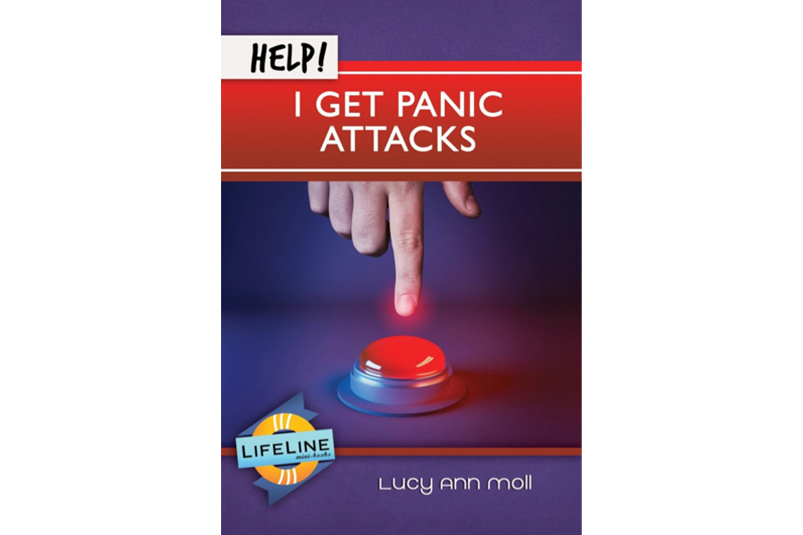
by Lucy | Oct 8, 2019 | biblical counseling, emotions
In this article, I talk about victory over panic attacks and share an excerpt from my new book HELP! I Get Panic Attacks, available as a paperback and in Kindle. If you or a loved one gets panic attacks, learn how to find increasing victory and make progress even when panic attacks seem to have the upper hand.
This article appeared here at Biblical Counseling Center, where I’m on staff and offer counseling by video-conferencing worldwide.

What? A biblical counselor who gets panic attacks? Yes, panic attacks can happen even to faithful Christians. I had full-blown, heart-pounding panic on and off for many years, though now this experience is rare for me.
In HELP! I Get Panic Attacks I share how my panic attacks began along with God’s solutions and practical assignments for you to use. The mini-book just came out this month and is available at Amazon and Shepherd Press. I wrote it to help panic attack sufferers (and their loved ones) know that there really is freedom from the terror that interferes with normal life and kills hope. There’s also a short section on the use of medication, reviewed by a medical doctor.
Here’s an excerpt. I hope it helps you. Please feel free to contact me with your questions.
My panic attacks started with a job promotion
My panic attacks started with a job promotion. When I became the new managing editor of a health and food magazine, Suzy, whom I replaced, advanced to the role of executive editor. This was a happy day for both of us, right? Wrong! On promotion day, Suzy gave me unsettling, steely stares all day.
Did I do something wrong? Why is she acting so weird? Does she hate me? Will I lose my dream job already?
Confused, hurt, and fearing Suzy’s disapproval, I practically sprinted from the office at 5 p.m. Once behind the wheel of my blue hatchback, I cranked up the tunes and zoomed toward the six-lane freeway that would take me to my “safe place”: a cozy Cape Cod house that I shared with my husband, Steve, and our fluffy feline. Like Dorothy in The Wizard of Oz, I repeated, “There’s no place like home. There’s no place like home.”
As I drove, I tried to forget Suzy’s disapproving stares, but they stuck in my head like superglue. Then, suddenly, seemingly out of nowhere, my heart beat triple-time. Sweat beaded on my forehead. I swallowed a lump in my throat. My knees became wobbly, like Jell-O. A horrific sense of impending doom settled on me. Then my mind went wacko as I came to a tight curve: Drive into the ditch, Lucy. Drive into the ditch. Drive into the ditch. In panicky desperation, I spoke back to the crazy thoughts filling my mind: What’s wrong with me? Dear God, am I suicidal? Stay on the highway, Lucy. Just stay on the highway. Your exit is a mile ahead. You can make it. You can make it. What’s wrong with me? God, help me!
Panic attacks are terrifying. But you already know this, since you picked up this mini-book. If you don’t experience them yourself, you’re surely aware of how they affect someone you know. As I share my story and the extreme fear experiences of a few others, I want to help you understand three truths that have helped me.
3 truths that helped me
First, you are not the only one who struggles with panic attacks.
No temptation has overtaken you that is not common to man. (1 Corinthians 10:13)
This Bible verse teaches that we all struggle, including those of us who are “fearful”—that is, who have a propensity for anxiety. The intensity and frequency of our fears may differ, but everyone at some point has freaked out.
Second, panic attacks often proceed from faulty thinking. But by God’s grace, you can change fearful thinking patterns into God-transformed, faithful thinking. This will require a willingness to trust and obey God, as well as perseverance. Your faulty thinking didn’t develop overnight, so it most likely won’t go away overnight. Mine didn’t.
Third, God promises to help you overcome the fear that precipitates your panic attacks, assuming they don’t have an organic, physical cause (more on this later). When you learn to realign your thoughts with God’s thoughts, your panic attacks can become a thing of the past. This is hopeful, isn’t it?
God can also use your panic attacks for good
God can also use your panic attacks for good. Like me, you might begin encouraging others who have panic attacks by listening to them and by sharing your story. This verse in 2 Corinthians is dear to my heart because it gives meaning to my struggle, and I hope it will help you too:
Blessed be the God and Father of our Lord Jesus Christ, the Father of mercies and God of all comfort, who comforts us in all our affliction, so that we may be able to comfort those who are in any affliction, with the comfort with which we ourselves are comforted by God. (2 Corinthians 1:3–4)
Perhaps this is difficult for you to believe, but God knows your fears and is able to deliver you from all of them. As you read this mini-book, you will learn practical ways to turn fear into faith. Will it be easy? No. It will require diligent effort. Will it be worth it? Yes. Your fears are one means God can use to help you learn to trust him and depend on him. Addressed biblically, they can become a doorway to experiencing the peace of God which comes through the Prince of Peace who conquers fear.


by Lucy | Sep 24, 2019 | biblical counseling, biblical counseling
Internet Porn: What You Need to Know to Keep Your Kids Safe
Hi friends, this is another PG-rated post on keeping your kids safe online. I cannot tell you the number of moms of all ages who’ve contacted me on keeping kids safe from internet porn. In fact, it’s as close as your kids’ cell phone. But you know this already, right?
You can read my post on cyberbullies on the Internet and on gaming consoles here. It tells the sad mad story of a cyberbully threatening to rape my teen son in my own home.
FACT: 93% of boys–and 62% of girls–have been exposed to Internet pornography before the age of 18. This means only 3% of boys and 17% of girls have never seen Internet porn. This statistic and some other material in this post comes from CovenantEyes.com.
Even if you’ve put in place precautions to keep your kids safe, it isn’t enough to block all exposure to internet pornography. As you probably know, children and teens who’ve had frequent exposures to sexually explicit photos and videos are more likely to:
~ have multiple sexual partners.
~ develop an addictive habit of watching porn.
~ mimic behaviors seen in porn.
This Ain’t 1970 Pin-Up Girls!
Do you remember the famous swimsuit poster of Farrah Fawcett, dressed in a red one piece? Too sexy, right?
This picture is tame compared to the hundreds of millions of hard-core photos available online at the click of a button. CovenantEyes.com reports that scientists theorize that early exposure to Internet porn may interfere with healthy sexual development while a child’s brain is developing through the teen years.
Certainly, God who created us knows what’s best for us. Listen to what Jesus said:
“You have heard that it was said, ‘You shall not commit adultery.’ But I tell you that anyone who looks at a woman lustfully has already committed adultery with her in his heart.” (Matthew 5:27,28)
and what Paul exhorted:
“You, my brothers and sisters, were called to be free. But do not use your freedom to indulge the flesh; rather, serve one another humbly in love. For the entire law is fulfilled in keeping this one command: “Love your neighbor as yourself.” (Galatians 5:13-14)
What You Can Do
Safeguard your computer and mobile devices by using parental controls and with software that blocks porn sites. Remember, keep in mind that your child may still see porn on others’ computers, smart phones, and tablets.
Also, know that the multi-billion-dollar porn industry uses tactics to seduce otherwise unsuspecting teens. Innocent word searches can bring up pornographic sites with banner ads that show “teaser” images. So armed with this knowledge you can talk lovingly and intelligently to you child about what to do when such sites pop up:
First, teach your kids to not click links.
Second, set an atmosphere where your children know that they can come to you and talk about sensitive subjects without fear.
Third, consider using a well-respected Internet accountability service like Covenant Eyes. Such services monitors Internet use and proves accountability reports to parents.
You Can Keep Your Kids Safe
You can keep your kids safe from Internet porn. Yes, porn images are everywhere on the Internet, and television too. It takes some work on your part to set up parental controls and to have difficult and uncomfortable conversations with your children, from 8 to 18.
But you can do it. And you can trust God to help them make wise choices and to repent when they make mistakes. You do NOT want them to become a statistic, like one of these:
13 percent of Web searches are for porn material.
About 55 percent of divorce cases involve either the husband or wife obsessively using porn websites.
Eight out of 10 unwanted exposures to Internet porn happens in the home.
Question: What are some ways you keep your children safe?


by Lucy | Sep 11, 2019 | biblical counseling, emotions |
FEAR. It’s the new four-letter word. It began long, long before 9/11, school shootings, and the controversy over our current president. Flip through the first pages of the Bible, and see its ugliness from the Fall to today.
In this brief article, you’ll discover:
- Fear often has its start in childhood.
- There’s a biblical solution to fear.
Fear usually begins early.
When fear begins early, it often takes on one of two main forms. For women: fear of rejection and abandonment creeps For men: the fear of failure.

For me, my fear of rejection goes back to my childhood. My mom was often sad and chain-smoked. And my dad was present physically but absent emotionally. And so, like many of my counselees, seeds of difficulty began sprouting early. We biblical counselors call these “sharing influences.” Yes, these shape our thoughts, emotions, and actions. However, they do not determine them.
My dad didn’t do anything horrible to me. He just didn’t notice me, really. And he never smiled. But I hoped to make him happy. In fact, I longed for his acceptance.
What about you? What triggered your fear of abandonment?
Click & Tweet!
When we try to control fear, it’s likely we’ll feel discouraged.
We each have ways of handling fear, right? But our solutions usually backfire.
My well-meant but messed-up solution: control. I attepted to control my to try to control him by being the perfect little girl who never got in trouble and brought home excellent report cards and who did everything right.
I didn’t.
I couldn’t.
And I felt sad.
Only much later did I learn he suffer manic-depression. Still, my fear of abandonment lingered.
God provides a better way.
God wants you to experience success, according to His definition. That is, he wants you to become more like Christ. God has planned that those who love Him “be conformed to the likeness of His Son” (Romans 8:29). Since Jesus is in us, and we in Him, we have confidence that no matter what happens–a home foreclosure, a child’s bad report card, illness, even the death of a loved one–He is with us and helps us.
Please know that everyone struggles with fear. You are not alone. Learning to defeat fear requires a shift in focus. So rather than focus on self, love God and love people more than their approval.
So now what?
- Recognize God is sovereign over your fears. He knows your struggle and helps you. So look to Him. Jesus lovingly commands, “But seek first His kingdom and His righteousness, and all these things will be given to you as well. Therefore do not worry. . .” (Matthew 6:33-34a).
- Choose to love people more than their approval. The apostle Paul wrote, “Am I now trying to win the approval of men, or of God? Or am I trying to please men? If I were still trying to please men, I would not be a servant of Christ” (Galatians 1:10).
Please remember that becoming more like Christ is a life-long process. Keep taking one step then another.
AN OFFER: I meet with women nearly every day by Skype/FaceTime/Zoom and help them find godly solutions to the problems they face. If you’d like a complimentary phone consult to see if biblical counseling is a good fit for you, simply contact me. NO spam, promise.


by Lucy | Aug 19, 2019 | biblical counseling, emotions, relationships
True happiness! Did you know that God made your brain in such a way that you can have this true happiness every day?
Many believers are taught that God wants us to be holy but not happy and that joy and happiness are fundamentally different. We’ve even been left with the impression that God himself isn’t happpy. Yet nothing could be further from the truth!
So says Christian author Randy Alcorn in his book Happiness.
If you’d like true happiness, consider these three parts of getting from where you’re at to where God wants you to be.
- Your thoughts make THE difference.
- Creating your own on-going happiness.
- Take the 3-minute focus challenge.
As you think healthy, godly thoughts, these new positive thoughts rewire your brain. Over time as they are repeated, your new thoughts become automatic positive thoughts that replace your old automatic negative thoughts. As your thoughts change so do your emotions. By the way, my popular “Transform Your Thoughts e-Journal” helps you learn to change your thoughts resulting in improved, godly emotions. Get it here.
Your thoughts make THE difference
Late last century, scientists began proving what God knew all along:
What you think every moment of every day deeply affects you.
Your mind is designed to control the body. Not the other way around.
While you and I cannot control the circumstances of life, we can control our response.
Neuroscientific research underscores the truth of this verse:
As a man thinks, so is he.” Proverbs 23:7
Crazy as it may sound, your thought life may contribute to 75 to 98 percent of mental, physical, and behavioral illness, says Dr. Caroline Leaf, a specialist in traumatic brain injuries and learning disabilities, and author of several books including Switch on Your Brain (Baker Books, 2013). Our bodies and minds are always interacting. One affects the other.
Our Great Physician has a remedy. Call it the 4:8 prescription, if you like.
Finally, brothers and sisters, whatever is true, whatever is noble,
whatever is right, whatever is pure, whatever is lovely, whatever is admirable
—if anything is excellent or praiseworthy—think about such things.
Philippians 4:8
True, noble, right, pure, lovely, admirable, excellent, praiseworthy — this is where God wants your focus. And isn’t God alone truly praiseworthy?
Creating On-Going Happiness
 As you think about “such things,” you experience a peace and contentment, which the average Joanne describes as happiness. In his letter to his like-minded Christians in Philippi, the apostle Paul said, “Whatever you have learned or received or heard from me, or seen in me—put it into practice. And the God of peace will be with you.” He encouraged them to follow his path to peace and contentment.
As you think about “such things,” you experience a peace and contentment, which the average Joanne describes as happiness. In his letter to his like-minded Christians in Philippi, the apostle Paul said, “Whatever you have learned or received or heard from me, or seen in me—put it into practice. And the God of peace will be with you.” He encouraged them to follow his path to peace and contentment.
More great news: You can observe your thoughts and make decisions about them! Yes, you can become aware of what you’re thinking and choose healthy thoughts leading to happiness. As one friend likes to say: Respond thoughtfully, don’t react emotionally.
Click & Tweet!
Make no mistake. A happy life of contentment isn’t comfort. Choosing Jesus first is outrageously uncomfortable yet always the pathway to true happiness.
Click & Tweet!
CHALLENGE: 3-Minute Thought Focus
Important to a happy life of contentment in Christ is tuning in to your negative self-talk so you can identify it as decrepit. Then you change it to positive inner thoughts. Here are three steps
First do this:
- Find a quiet place to sit, and take two or three deep breaths. Feel your body begin to relax.
- For a minute or two minutes, tune in to your self-talk. What are you saying to yourself? Jot down a few of your thoughts.
Now do this:
- Ask yourself, Is my thought negative?
- Then ask, What positive 4:8 thought can replace this negative thought? Write it down.
EXAMPLE:
Negative thought: “My boss is a jerk. She says I can’t do anything right!”
4:8 thought: “I choose to work hard even though my boss is inconsiderate. I know God is with me and gives me wisdom in handling this work relationship, so I trust him.”
During the rest of the day:
Every time you have the negative job thought, replace it with the positive 4:8 thought.
Happy on Repeat!
As you replace your negative thought with the new positive, God-honoring thought, your brain makes new neural pathways, researchers have found. Just think–by improving the environment of your inner thought life, you’ll experience peace, contentment, and, yes, happiness.
If you need help with this, let me know. I’ve been counseling women and families by the effective, comforting promises and truth of the Bible since 2008 by online video worldwide.

by Lucy | Aug 12, 2019 | emotions, whole health wellness |
Have you ever had a time when everyday stress overwhelmed you? Everyday stress is an emotional or mental strain that can happen to anyone but isn’t life altering like witnessing a mass shooting or receiving a cancer diagnosis. As I share my own everyday stress story, let’s remember the comforting truth that God promises to stick with us.
God’s your safe place. Always.
Click & Tweet!
That said, we also need biblical solutions for handling the anxiety that comes with everyday stress. I’m sharing three of my best stress smashers. With the help of God’s word, we all can regain the peace the soul desperately desires … even when our circumstances do not change.
Click & Tweet!
This everyday stress was a surprise
Mine began as many bad things do — with no warning. A while back, I skipped several days of exercise. Feeling guilty for eating too many cookies and skipping workouts, I decided to exercise for ten minutes in my living room.
First I stretched. Then I did sit-ups. But …
rather than doing my usual crunches — which, in retrospect, I SHOULD HAVE DONE — I tucked my feet under the couch, laid on back, and rolled all the up to sitting and back down. On sit-up numero ocho, something in my back didn’t feel right. Nonetheless, I pressed on and completed two more full sit-ups, far short of my goal. I rubbed my back and called it a day — and didn’t think much of my situps
until the next morning
when I awoke to an intense clenching in my lower back muscles and numbness in my legs. I elbowed my snoozing husband.
Steve, something’s wrong. I need your help. Steve, wake up. I need you.
He heard fear in my voice, listened to my story of super-tight back muscles, and got me a pain reliever. He assured me, “You should be better in a few days. Just rest. We’ll take care of the house stuff. Don’t worry.”
Then it got worse
My family cooked, laundered, and swept while I was laid up and my kitty curled next to me. I began to feel a bit better, but then I learned that a close family member needed daily injections. Nothing life threatening, but important and another thing to deal with
while my back continued to spasm and the numbness in my legs lingered.
I remember thinking and praying, “God, the doctor said I should be better in four to eight weeks. I’m not. Walking and standing hurts, and my legs and feet feel bubble-wrapped, and now a family member is hurting. Help us.”
And worse
Things seems to happen in threes, right? Another family member received bad health new. So I prayed again.
And again. More intensely. Desperately. I remembered this quote:
God whispers to us in our pleasures. He speaks to us in our conscience, but He shouts to us in our pain. It is His megaphone to rouse a deaf world. –C.S. Lewis
God had my attention. Soon, fear accompanied the pain. And my thoughts turned inward and became increasingly negative.
Will the doctors have a treatment that works?
Has God forgotten me? Is He punishing me? Does He care?
It turned out that my back got better after physical therapy. I continue to do the exercises to this day. As God providentially worked in my circumstance to bring healing, I learned at least three strategies to smash everyday stress.
3 Strategies for Handling Everyday Stress
We face everyday stresses of all sorts every day: unexpected bills, car problems, an argument with a loved one, traffic. Our reactions to these stresses reveal what’s in our heart (or, our true inner person). For instance, when stressed, we may become angry and lash out, or anxious and worry, or sad and mope. Scripture says,
No temptation has overtaken you that is not common to man. God is faithful, and he will not let you be tempted beyond your ability, but with the temptation he will also provide a way of escape, that you may be able to endure it (1 Cor. 10:13).
Here are three ways to handle stress anxiety by learning to trust God.
1. Agree with God
Agree with God that he cares about you, is with you, and is more concerned with conforming you to the image of his Son, Jesus, than making your everyday stress vanish like the wind. We live in a fallen world with all sorts of troubles.
REFLECT: What troubles are you facing now? Will you agree with God that He has a purpose for your problems?
2. Accept Your Situation (and improve it, if you can)
Give thanks to God in all circumstances; for this is the will of Christ Jesus for you.
What this verse is saying is the proper response to everyday stress is thanksgiving because we recognize that He is supremely in control of whatever comes your way for your good and his glory. We accept our situation as God’s good plan, thanking Him for how he is using it to transform us. Yet, if we can improve our circumstance, we often should.
Didn’t David kill Goliath when the giant taunted the Israelites? The men who spied out Jericho found a place to hide at Rahab’s home, right? And Jesus often slipped through the crowds who wanted to detain him. I sought help from a doctor, physical therapists, and medication.
ACTION: An excellent way to give thanks in all circumstances is keeping a list of reason to give thanks to God and adding to it daily.
3. Affirm the Truth
As your mind and your thinking are renewed by the Word of God, you gain a godly perspective of your everyday stress anxiety and are able to discern God’s will. Read Romans 12:2 carefully. Take time to meditate (or think carefully) about each phrase. Commit it to memory. Then consider what passages such as Psalm 23 and Romans 8:28-39 say about God. Ask yourself, What do these verses reveal about the character of God and His heart toward his children?
THINK: In light of God’s character and His loving-kindness toward us, how might we regain the peace that the soul desperately desires when we face everyday stresses?
Are you in the midst of S-T-R-E-S-S now? Need help?
Click & Tweet!
As a biblical counselor certified by ACBC who has counseled women and families worldwide by Skype, FaceTime, and Zoom, I invite you to look over my articles and to contact me with your questions.












